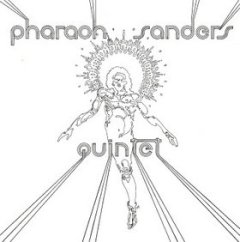Pharoah Sanders Quintet – Pharoah's First (1965)
Pharoah Sanders Quintet – Pharoah's First (1965)

1 Seven By Seven 26:20 2 Bethera 23:40 Personnel: William Bennett - Bass (2) Marvin Pattillo - Percussion Jane Getz - Piano Pharoah Sanders - Tenor Saxophone Stan Foster - Trumpet (2)
Hindsight can work wonders on the perception of a jazz musician's career, which makes it an exceptionally valuable tool to look at that artist's early recordings. Through the historian's lens, we can find snippets of what is to come in that first solo, a young-but-confident blueprint of artistic trajectory as well as some startling differences. Jazz Advance, for example, paints Cecil Taylor as a bizarrely-shaped branch of the Herbie Nichols tree, and it is hard to see the connection between Trane's spot as a lanky upstart in Dizzy Gillespie's band and Ascension. Yet on tenor man Pharoah Sanders' first date as a leader (and his first known commercially-released recording), we can see major stylistic hallmarks already present in a standard quintet format, a soloistic presence that will, in the years to come, be both nurtured and broken apart.
Sanders came to New York from San Francisco in 1962 and spent much of this early period scuffling, often homeless and barely working as a musician. His first break came as part of an early Don Cherry band in 1963, a quintet that recorded several pieces for Savoy that have never been issued, a band that also featured pianist Joe Scianni and stalwart Ornette bassist David Izenzon. By 1964, Sanders was working in a cooperative group with pianist/composer Carla Bley and percussionist Charles Moffett, as well as in various Cherry aggregations and, in September of that year, brought a quintet into Jerry Newman's studio to record ESP 1003, Pharaoh (later retitled Pharoah's First—his name taking on the altered spelling somewhere in this period).
Joining the tenor man on two side-long blowing numbers were drummer Marvin Patillo, who would record with Sonny Simmons (Staying on the Watch, ESP), pianist Jane Getz (a Mingus alum who would later record folk blues for Verve-Forecast), trumpeter Stan Foster, and bassist William Bennett. One might half expect Sanders to have brought with him some of his regular associates at the time—Moffett, Henry Grimes, altoist Byron Allen—but in many ways, his compatriots here are a blessing, if a mainstream hard bop ensemble.
"Seven By Seven would not have sounded out of place on Giant Steps, even the opening chorus of Sanders' lilting tenor, which sounds for all the world like one of Trane's earlier workouts until it is summarily given a tug of war between those keening hallmark Trane phrases and grotesque honks and multiphonics that, if not the bandsaw-on-sheet metal that would be a hallmark of solos on "Om, for example, certainly belie an allegiance to another world of sound that is as much the "Holy Ghost as it is the "Father."
Sanders' heel-digging buzzes and screams are made ever more stark in their presence by the rhythm section, Getz's piano comping seemingly unsure of its job and summarily distracted while Bennett's rock and Patillo's Philly Joe licks seem to be the most respondent (and, in a way, unwavering) with Sanders' whims. Foster contributes a pinched, nasal trumpet solo that, while certainly not exactly hard bop, is unsure of exactly how to follow the tenor, even as Patillo builds a rising tide of percussion thermals to spur on the proceedings. Getz takes a thoughtful, well-constructed Tyner/Evans-esque solo that is surreally out of place with its preceding context, before Sanders, Foster and the pianist enter into a collective improvisation to take the piece out.
"Bethera has a head that might have been copped from an earlier Trane blues, its theme even less a springboard for free improvisation, but Pharoah somehow finds a slight descending chord on which to harp his guttural yelps, even as much of this lengthy solo takes on a tonal aesthetic that is decidedly Atlantic-era Trane. Despite these tonal affinities, and it is something that is more noticeable in a "'straighter number such as this, Sanders seems to be utilizing phrase-based free association (á la Newk or Cherry), rather than necessarily moving through and wringing out chords and modes as Trane had.
This is a crucial difference between these two reedmen, and as much as young Sanders was beholden to Trane—of course, it would not be long before he joined Trane's quintet—he is decidedly into something uniquely his even at this early stage. Getz and Foster sound noticeably more at home here and Patillo and Bennett seem comfortable easing up. Nevertheless, this would be the last time for a number of years that Sanders would utilize a more "mainstream band for his work.
Pharoah's First, though somewhat of an aesthetic anomaly in the ESP catalog and, at the time, given more 'could-have-been' status than it probably deserved, is a crucial workshop puzzle-piece that gives historians of improvised music one very important look at Pharoah Sanders and his young, big ideas. ---Clifford Allen, allaboutjazz.com
Last Updated (Thursday, 02 April 2015 21:52)








